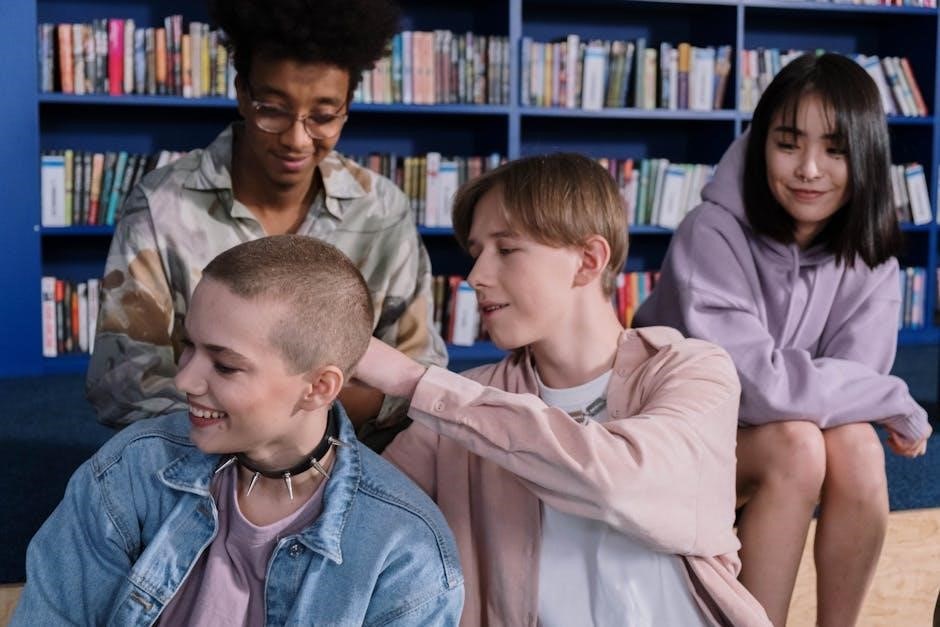Sean Covey’s The 7 Habits of Highly Effective Teens offers a powerful guide for teens to master essential life skills, fostering self-improvement and wise decision-making.
Overview of the Book and Its Importance
The 7 Habits of Highly Effective Teens by Sean Covey is a transformative guide tailored for teenagers, offering practical advice to navigate life’s challenges. Adapted from his father Stephen Covey’s iconic book, it addresses issues like self-image, peer pressure, and goal-setting. The book’s importance lies in its ability to empower teens with timeless principles, helping them build resilience and confidence. Its relatable tone and real-life examples make it a must-read for young people seeking to improve their lives. Available in PDF, it’s accessible to modern readers, providing a roadmap for personal growth and success. Its impact has made it a beloved resource for teens worldwide.
Why Teens Need These Habits in Modern Times
In today’s fast-paced, high-pressure world, teens face unique challenges, from social media to academic stress. The 7 Habits provide essential tools to navigate these complexities, fostering resilience and confidence. By teaching proactive behavior, goal-setting, and healthy relationships, the habits empower teens to make wise decisions and thrive. In a world filled with distractions, these principles help teens stay focused on what truly matters. The habits also address mental health and self-care, crucial for modern teenagers. By applying these timeless principles, teens can build strong foundations for success, preparing them to overcome challenges and achieve their full potential in an ever-changing world.

Habit 1: Be Proactive
Proactivity means taking initiative and responsibility for one’s life, focusing on what can be controlled, and choosing responses wisely to create positive outcomes and personal growth.
Definition and Meaning of Proactivity
Proactivity is about taking initiative and responsibility for your life. It means focusing on what you can control and choosing how to respond to challenges. By being proactive, teens can avoid blaming circumstances and instead create positive outcomes. This mindset encourages self-awareness, personal growth, and effective problem-solving. Proactivity is not just about action; it’s about intentional, values-driven behavior that leads to greater self-confidence and resilience. By embracing this habit, teens can transform their approach to life, moving from reactive to proactive, and unlocking their full potential for success and happiness.
Practical Examples for Teens
Proactivity in action for teens can be seen in everyday decisions. For instance, instead of waiting for opportunities, a proactive teen might start a study group or volunteer for a cause they care about. If they notice a problem, like bullying at school, they could take initiative by talking to a teacher or organizing a kindness campaign. Proactive teens also anticipate challenges, like saving money for college or setting personal goals. By taking charge of their choices and actions, teens can build confidence, responsibility, and a sense of control over their lives, leading to greater success and fulfillment.
How to Apply Proactivity in Daily Life
Applying proactivity daily starts with self-awareness and intentional choices. Teens can practice by setting personal goals and taking initiative in tasks, like completing homework without prompting or solving problems independently. Using a planner or digital tools to stay organized helps anticipate responsibilities. Proactive teens also embrace challenges as growth opportunities, such as stepping out of their comfort zones to join clubs or sports. By focusing on what they can control and adopting a positive mindset, teens can develop habits that lead to greater independence, problem-solving skills, and confidence, preparing them for future success and fostering a proactive lifestyle from an early age.

Habit 2: Begin with the End in Mind
Habit 2 encourages teens to set long-term goals and create a personal mission statement, guiding their decisions and helping them stay focused on what truly matters.
Setting Long-Term Goals for Teens
Setting long-term goals is crucial for teens to gain clarity and direction in life. According to Sean Covey, these goals should align with personal values and aspirations, helping teens prioritize what truly matters. Whether academic, personal, or career-related, long-term goals provide a roadmap for success. Teens are encouraged to reflect on their future vision and break down larger objectives into manageable steps. This habit empowers them to stay focused and motivated, even when faced with challenges. By setting clear, meaningful goals, teens can create a strong foundation for achieving their desires and living a purpose-driven life. This practice fosters accountability and resilience.
Creating a Personal Mission Statement
A personal mission statement is a powerful tool for teens to define their purpose and values. Sean Covey emphasizes that this statement should reflect one’s core beliefs and long-term goals. It serves as a guiding light, helping teens make decisions that align with their identity. By crafting a mission statement, teens can clarify their priorities, whether related to family, education, or personal growth. This habit encourages self-reflection and self-awareness, empowering teens to stay true to their principles. A well-defined mission statement fosters focus and direction, enabling teens to navigate life’s challenges with confidence and intentionality, leading to a more fulfilling and purposeful journey.
Aligning Daily Actions with Future Goals
Aligning daily actions with future goals is crucial for teens to achieve long-term success. Sean Covey suggests that by prioritizing tasks and focusing on what truly matters, teens can bridge the gap between their current efforts and future aspirations. This habit encourages teens to evaluate how their daily choices impact their bigger life goals. By creating a clear plan and sticking to it, teens can avoid distractions and stay committed to what they want to accomplish. Regular reflection on progress helps maintain alignment, ensuring that everyday actions contribute meaningfully to their vision of the future, fostering discipline and accountability in pursuit of their objectives.

Habit 3: Put First Things First
Habit 3 focuses on effective time management, teaching teens to prioritize tasks and avoid distractions, ensuring they focus on what truly matters to achieve their goals.
Time Management for Teens
Effective time management is crucial for teens to balance school, extracurricular activities, and personal life. Sean Covey’s book introduces the Time Management Matrix, helping teens prioritize tasks into four categories: urgent and important, important but not urgent, urgent but not important, and neither urgent nor important. By focusing on what truly matters, teens can avoid procrastination and reduce stress. This habit encourages them to schedule time for homework, hobbies, and self-care, ensuring they make the most of their day. Mastering this skill helps teens develop a sense of control and accountability, setting them up for long-term success and productivity.
Using the Time Management Matrix
The Time Management Matrix, introduced in Sean Covey’s book, is a simple yet powerful tool for teens to organize tasks based on urgency and importance. It divides activities into four quadrants: Quadrant 1 (urgent and important), Quadrant 2 (important but not urgent), Quadrant 3 (urgent but not important), and Quadrant 4 (neither urgent nor important). Teens are encouraged to focus on Quadrant 2 for long-term goals and delegate or eliminate tasks in Quadrants 3 and 4. By using this matrix, teens can prioritize effectively, reduce stress, and allocate their time wisely, ensuring they accomplish what truly matters while minimizing distractions and time wastage.
Prioritizing Tasks Effectively
Sean Covey emphasizes the importance of prioritizing tasks to enhance productivity and reduce stress. Teens are encouraged to focus on what is truly important rather than getting bogged down by urgent but less significant tasks. By learning to distinguish between tasks that align with their goals and those that do not, teens can allocate their time more efficiently. Simple tools like to-do lists or digital apps can help organize and prioritize tasks. Covey suggests avoiding multitasking and instead concentrating on one task at a time to ensure quality and completion. This habit helps teens develop a sense of control and accomplishment, fostering a balanced and productive lifestyle.
Habit 4: Think Win-Win
Habit 4 encourages teens to seek mutually beneficial solutions, fostering healthy relationships and positive conflict resolution by valuing everyone’s needs and desires.
Understanding the Win-Win Mindset
The Win-Win mindset is about seeking solutions where everyone benefits, fostering mutual respect and collaboration. It encourages teens to think beyond their own needs, valuing others’ perspectives and desires. This habit helps build trust, strengthens relationships, and resolves conflicts positively. By focusing on shared success, teens can create environments where everyone feels valued and heard. The Win-Win approach promotes empathy, cooperation, and long-term positive outcomes, teaching teens to balance their own goals with the well-being of others, leading to stronger, healthier relationships and a more supportive community.
Building Healthy Relationships
Healthy relationships are foundational for teen success and well-being. The 7 Habits guide teens to communicate effectively, respect boundaries, and value others. By practicing empathy and understanding, teens can foster trust and connection. Active listening and open dialogue help resolve conflicts and strengthen bonds. The Win-Win mindset encourages collaboration, while self-awareness promotes emotional intelligence. These principles empower teens to build lasting friendships, support family ties, and navigate peer dynamics positively. Strong relationships contribute to personal growth and a supportive network, helping teens thrive in all areas of life while maintaining their individuality and integrity in every interaction.
Resolving Conflicts Positively
Conflicts are inevitable, but how teens handle them matters. Sean Covey’s 7 Habits guide teens to approach disagreements with a Win-Win mindset, seeking solutions that benefit everyone. Active listening and empathy are key, helping teens understand others’ perspectives. By focusing on mutual respect and open communication, conflicts become opportunities to strengthen relationships. Teens learn to remain calm, avoid blame, and address issues constructively. This approach fosters a positive environment, builds trust, and equips teens with essential conflict-resolution skills for lifelong success, both personally and in their interactions with others, ensuring they can navigate challenges with maturity and confidence.

Habit 5: Seek First to Understand, Then to Be Understood
This habit emphasizes the importance of active listening and empathy. Teens learn to truly understand others’ perspectives before seeking to be understood themselves, fostering deeper connections.
The Importance of Active Listening
Active listening is a cornerstone of effective communication. By fully focusing on others, teens can grasp their thoughts and feelings without interruption. This fosters empathy, resolves conflicts, and builds trust. Sean Covey highlights that listening deeply helps teens understand different perspectives, which is crucial in relationships. It encourages open dialogue and mutual respect, making it easier to navigate challenges. Regular practice of active listening strengthens interpersonal skills, leading to stronger, more meaningful connections. This habit is vital for teens to communicate effectively and maintain healthy relationships in their personal and social lives. It’s a skill that benefits them lifelong.
Empathy and Perspective-Taking
Empathy and perspective-taking are vital for building strong, meaningful relationships. By understanding others’ feelings and viewpoints, teens can connect on a deeper level, fostering trust and mutual respect. Sean Covey emphasizes that empathy allows teens to “walk in others’ shoes,” which helps in resolving conflicts and fostering compassion. Perspective-taking encourages openness to different ideas, promoting inclusivity and collaboration. These skills are essential in a diverse world, helping teens navigate social challenges and build bridges between differing opinions. By practicing empathy, teens can communicate more effectively, strengthen friendships, and create a supportive environment for everyone. This habit is key to fostering harmony and understanding.
Effective Communication Skills
Effective communication is a cornerstone of strong relationships and personal success. Sean Covey emphasizes the importance of clear, honest, and respectful expression of thoughts and feelings. Teens learn to listen actively and express themselves confidently, ensuring their message is heard and understood. This habit encourages the use of “I” statements to avoid blame and defensiveness, fostering constructive conversations. By practicing effective communication, teens can resolve conflicts, build trust, and strengthen friendships. Clear expression and open dialogue help teens navigate social challenges and express their needs while respecting others. This skill is essential for collaboration and mutual understanding in all areas of life.

Habit 6: Synergize
Synergy occurs when collaboration creates outcomes greater than individual efforts. Teens learn to value teamwork, combine strengths, and achieve more together, overcoming limitations and fostering innovation.
What Synergy Means for Teens
Synergy is about teamwork and collaboration, where the combined efforts of individuals create outcomes greater than what could be achieved alone. For teens, this means valuing diverse perspectives, sharing ideas, and working together to solve problems. It encourages mutual respect and open communication, helping teens overcome challenges more effectively. Synergy is not just about cooperation; it’s about creating something new and better through collective effort. By embracing synergy, teens can achieve their goals more efficiently and develop stronger relationships with peers. This habit fosters creativity, leadership, and a growth mindset, essential for success in all areas of life.
Collaboration and Teamwork
Collaboration and teamwork are vital for teens to achieve common goals, requiring effective communication and mutual respect. By working together, teens can pool their strengths, share ideas, and support one another. This fosters a sense of unity and shared responsibility, leading to greater success. Teamwork also helps teens develop interpersonal skills, such as active listening and conflict resolution. Sean Covey emphasizes that when teens collaborate, they learn to value diverse perspectives and build stronger relationships. Through teamwork, teens can overcome challenges more effectively and create outcomes that are greater than individual efforts. This habit is essential for personal and collective growth.
Creative Problem-Solving
Creative problem-solving encourages teens to think outside the box and explore innovative solutions to challenges. By combining resources and ideas, they can address issues more effectively. Sean Covey highlights that synergy leads to solutions that individuals alone might not achieve. Teens learn to approach problems with a fresh perspective, fostering imagination and resourcefulness. This habit helps them navigate complex situations, whether academic, social, or personal, by leveraging teamwork and creativity. Through creative problem-solving, teens develop the confidence to tackle challenges head-on, leading to more effective and enduring outcomes. This skill is crucial for overcoming obstacles and achieving success in all areas of life.
Habit 7: Sharpen the Saw
Habit 7 focuses on self-care and personal growth, emphasizing the importance of balancing physical, emotional, and mental health to maintain effectiveness in all areas of life.
Self-Care for Teens
Self-care for teens is essential for maintaining balance and well-being. It involves taking care of physical health through exercise and nutrition, emotional health by recognizing and managing feelings, and mental health by engaging in activities that bring joy and relaxation. Prioritizing self-care helps teens build resilience, improve focus, and develop a positive self-image. By incorporating habits like regular sleep, mindfulness, and hobbies, teens can create a routine that supports their overall growth. Sean Covey emphasizes that self-care is not selfish but a necessary investment in one’s ability to be effective in all areas of life, fostering long-term success and happiness.
Balancing Physical, Emotional, and Mental Health
Balancing physical, emotional, and mental health is vital for teens to thrive. Physical health involves regular exercise, a balanced diet, and adequate sleep. Emotional health requires understanding and managing emotions, practicing empathy, and nurturing relationships. Mental health includes maintaining a positive mindset, setting realistic goals, and engaging in relaxing activities. By harmonizing these areas, teens can build resilience, improve academic performance, and foster healthier relationships. Sean Covey underscores that neglecting any aspect can lead to imbalance, while balance promotes overall well-being and long-term success. Prioritizing these elements helps teens navigate challenges effectively and cultivate a holistic approach to life.
Continuous Self-Improvement
Continuous self-improvement is about regularly enhancing personal growth and capabilities. Teens can achieve this by setting achievable goals, engaging in self-reflection, and seeking feedback. Activities like reading, journaling, and learning new skills foster intellectual and emotional development. Sean Covey emphasizes the importance of self-awareness and resilience in overcoming setbacks. By embracing challenges and learning from failures, teens build confidence and character. This habit encourages a proactive approach to personal development, ensuring teens are constantly evolving and bettering themselves in all aspects of life, leading to a more fulfilling and purposeful journey.

Applying the 7 Habits in Real Life
Sean Covey’s strategies empower teens to apply the habits in daily life, fostering success stories where self-image and decision-making improve, leading to lasting positive change.
Success Stories from Teens Who Applied the Habits
Many teens have transformed their lives by applying the 7 habits, achieving improved self-image, stronger friendships, and better decision-making skills. For instance, some teens reported enhanced academic performance and healthier relationships by prioritizing tasks and thinking win-win. Others credited the habits for helping them resist peer pressure and build confidence. Real-life examples show how these principles foster resilience, enabling teens to overcome challenges like bullying or family conflicts. The habits have also empowered teens to set and achieve long-term goals, such as earning scholarships or starting community projects. These success stories highlight the profound impact of the 7 habits on teenage lives worldwide.
Common Challenges and Solutions
Teens often face challenges like procrastination, peer pressure, and self-doubt when applying the 7 habits. To overcome these, they can use tools like the Time Management Matrix to prioritize tasks and reduce procrastination. Building a supportive network of friends and mentors helps resist negative influences. Practicing empathy and active listening, as in Habit 5, fosters healthier relationships. Teens can also overcome self-doubt by focusing on small, achievable goals aligned with their personal mission statements from Habit 2. By consistently applying these habits, teens develop resilience and confidence to navigate life’s challenges effectively.
Long-Term Benefits of Practicing the Habits
Practicing the 7 habits fosters lasting personal growth, enhancing self-discipline, emotional intelligence, and decision-making skills. Teens develop stronger relationships, improved self-image, and increased confidence. These habits cultivate a mindset of responsibility and purpose, preparing teens for success in education, careers, and beyond. By mastering proactivity, goal-setting, and empathy, they build a foundation for lifelong effectiveness. Over time, these principles become second nature, guiding teens to achieve their potential and create meaningful impact in their lives and communities. The long-term benefits include a stronger sense of direction, resilience, and the ability to navigate life’s challenges with wisdom and confidence.

Additional Resources and Tools
Find the PDF, workshops, and online communities for additional tools and support. Explore guides and forums to deepen your understanding of the 7 habits.
Where to Find the PDF Version
The PDF version of The 7 Habits of Highly Effective Teens can be easily accessed online through platforms like Amazon, Barnes & Noble, Google Play Books, or OZON.
Many retailers offer digital versions for instant download, allowing teens to carry the guide on their devices. Additionally, online communities and forums often share links to the PDF, making it widely available for those seeking self-improvement tools. Ensure to purchase from authorized sources to support the author and enjoy a seamless reading experience. This convenient format helps teens apply the habits anywhere, anytime, fostering personal growth and success in their daily lives.
Workshops and Training Programs
Workshops based on The 7 Habits of Highly Effective Teens are designed to empower teens with practical tools for personal growth and leadership. These programs, often led by certified facilitators, include interactive activities, group discussions, and real-life applications of the habits. Schools, community centers, and organizations frequently host these sessions to help teens build confidence, improve relationships, and make better decisions. The Wade Edwards Learning Lab, for example, offers a seven-night series focusing on the habits, making them accessible and engaging for young audiences. Such workshops provide a supportive environment for teens to embrace the principles and apply them in their daily lives.
Online Communities and Forums
Online communities and forums dedicated to The 7 Habits of Highly Effective Teens provide a space for teens to connect, share experiences, and discuss challenges. Platforms like Reddit, Facebook groups, and specialized forums offer a supportive environment for young people to explore the habits. Many of these communities are moderated by experts or individuals who have successfully applied the principles in their lives. Teens can ask questions, seek advice, and gain insights from peers and mentors. These forums also often share resources, such as study guides or personal success stories, helping teens stay motivated and accountable on their journey to effectiveness.
The 7 Habits of Highly Effective Teens empowers teens with timeless principles for personal growth, success, and resilience, shaping a strong foundation for their future.
Summarizing the Key Takeaways
The 7 Habits of Highly Effective Teens provides a clear framework for teens to enhance their personal development. By being proactive, setting clear goals, and prioritizing tasks, teens can gain control over their lives. The habits encourage empathy, effective communication, and collaboration, fostering strong relationships. Regular self-care and continuous improvement ensure sustained growth. These practical principles help teens navigate challenges, build confidence, and achieve their goals, laying a solid foundation for future success. The book’s insights are actionable and relevant, making it a valuable resource for teenagers striving to become their best selves.
Encouragement to Start the Journey
Embracing the 7 habits is a transformative step toward personal growth. Teens are empowered to take charge of their lives, build resilience, and create meaningful relationships. By starting small and practicing consistently, they can develop a strong foundation for future success. The journey may have challenges, but the rewards are immense, leading to increased confidence and a clearer sense of purpose. Encouraging teens to commit to these habits fosters a mindset of continuous improvement and self-awareness, equipping them to thrive in an ever-changing world. The time to begin is now, as every step forward brings them closer to their full potential.
The Impact of the 7 Habits on Teenage Success
The 7 habits have a profound impact on teenage success by fostering self-awareness, resilience, and effective decision-making. Teens who embrace these principles develop strong character, improved relationships, and a clear sense of direction. By learning to be proactive, prioritize, and synergize, they gain the tools to overcome challenges and achieve their goals. The habits empower teens to build confidence, resist negative influences, and cultivate a growth mindset. Ultimately, these principles lay a foundation for long-term success, helping teens navigate adolescence and beyond with purpose and poise. The transformative power of the 7 habits equips them to thrive in all areas of life.

